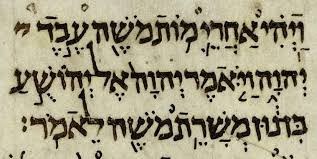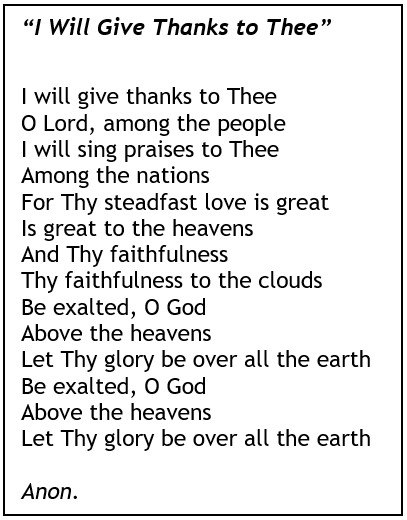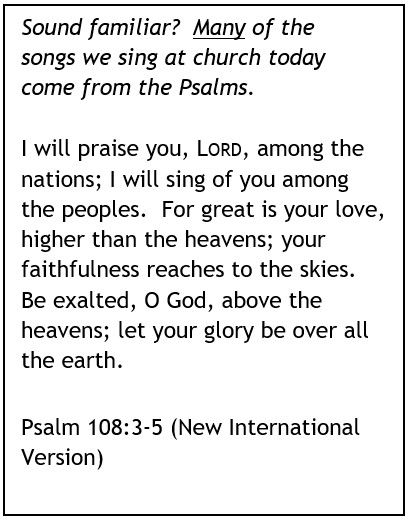Session Four - Wisdom Literature: Job to Song of Songs
Introduction
Wisdom literature was a category of writings in many cultures in the time of the Old Testament. Wisdom literature in the Bible (sometimes called the "poetic books"), deals with the way the world "works." It deals with big philosophical problems and the smaller things that can be met with common sense. What could be more practical than questions of the meaning of life, human relationships, suffering, the use of money and power, how to work and love, and our desire or order and purpose in the chaos of life?
In the Old Testament, there are five books that are classified as wisdom literature. These five books are not complex ancient philosophy, but timeless pastoral works that speak as powerfully today as when they were written.
1. Job
Author:
The Book of Job does not specifically name its author. The most likely candidates are Job, Elihu (one of Job's friends), Moses and Solomon. It is very difficult to come up with a reliable date of writing.
Job relates the account of a righteous man who suffers under terrible circumstances. The book's profound insights display the author's understanding of the "big questions" that most people have. Job opens with a scene in heaven where Satan comes to accuse Job before God. He insists Job only serves God because God protects and blesses him. Satan seeks God's permission to test Job's faith and loyalty. God grants this permission, but within certain limits.

An old manuscript of Job
Job is a faithful man (we do not know much about him, even if he was an Israelite; there is no reference to the Law, El Shaddai is used more often than Yahweh). Job loses everything during this testing process. Job has three friends who tell him that he must obviously be guilty of some great sin and that he should confess it and perhaps God will restore him (Job 11:13-15). Three friends, Eliphaz, Bildad and Zophar, come to "comfort" him and to discuss his crushing series of tragedies. They insist his suffering is punishment for sin in his life. Job, however, remains devoted to God through all of this and contends that his life has not been one of sin. A fourth man, Elihu, tells Job he needs to humble himself and submit to God's use of trials to purify his life. Finally, Job questions God Himself and learns valuable lessons about the sovereignty of God and his need to totally trust in the Lord. In their view, this kind of thing only happens to sinful people. Job maintains his innocence but comes close to questioning God's justice because, in his world, things like this should only happen to sinful people. In the end, God appears to Job and emphasizes the fact that what He is doing is bigger than any formula or set answers that people make up (chapters 38-41).

Job and his "friends".
Job reminds us that there is a "cosmic conflict" going on the behind the scenes that we usually know nothing about. Often, we wonder why God allows something, and we question or doubt His goodness, without seeing the full picture. The book teaches us to trust God in all circumstances. We must trust God, not only WHEN we do not understand, but BECAUSE we do not understand. Psalm 18:30 tells us, "As for God, His way is perfect. If this is so, then we can trust that whatever He does - and whatever He allows - is also perfect. This may not seem possible to us, but our minds are not God's mind. God reminds us, "My thoughts are not your thoughts, neither are your ways my ways, says the LORD. For as the heavens are higher than the earth, so are my ways higher than your ways and my thoughts than your thoughts" (Isaiah 55:8-9). Our responsibility is to obey God, to trust Him and to submit to His will, even when we do not understand what is going on.
Why do the righteous suffer? This is the question raised after Job loses all his family (except his wife, who nags him), his wealth, reputation and health. The book does not answer Job's questions or explain his circumstances, but there comes a point in the story when all that Job has left is a determination to trust God. Evil exists in the world, but God is just. It is not true that only the wicked suffer (this would reduce suffering to a formula about punishment), so being a Christian does not shield us from challenges others face. At the end of the account, Job is restored to health, happiness and prosperity beyond his earlier state. That does not always happen; as Christians we must learn to trust God's goodness, including for things we do not understand or cannot control. Learn to take a "long" look.
2. Psalms
Authors:
Although David did not write all of the Psalms, he is the author of most of them, with eighty Psalms accredited to him. Other writers include Moses, Heman the Ezrahite, Ethan the Ezrahite, Solomon, Asaph, and the sons of Korah. Several Psalms do not come with any author credit.
The Psalms are a collection of songs and poems of praises and prayers to God on a number of themes and circumstances. They are impassioned, vivid and concrete, rich in imagery, simile and metaphor.

The book of Psalms is one of the most used books in the Bible. There are 150 psalms. Many of them deal with the difficult problems of life such as "why do the wicked prosper?" and "if God loves me, why is this happening to me?" The Psalms constitute the largest book in the entire Bible. The New Testament quotes the book more than 75 times. The epistle to the Romans, written by Paul, quotes or references it more than fourteen times.
The book of Psalms not only contains the shortest and longest chapters of Scripture, but also the very centre of the Bible. Many of the Psalms are prophetic in nature. Jesus told his disciples, after his resurrection, that what happened to him was prophesied (in part) in the Psalms (Luke 24:44). The Psalms also offer prophecies centred on Jesus Christ. They predict his birth (104:4), deity (45:6), ministry (69:9), rejection (118:22), betrayal (41:9), his crucifixion and the words he would speak (22), resurrection (2 and 16), ascension into heaven (68:18) and everlasting reign (102:26).
Psalm 73 is an example of a "philosophical" psalm. The writer looks around at how sinful people are apparently prospering and is tempted to envy them because they seem to have it so good. "My feet had almost slipped; I had nearly lost my foothold. For I envied the arrogant, when I saw the prosperity of the wicked" (Psalm 73:2-3). But then he remembers that their prosperity is only for a limited period of time. He considers what will happen to them in the end: "Those who are far from you will perish; you destroy all who are unfaithful to you. But as for me, it is good to be near God. I have made the Sovereign Lord my refuge; I will tell of all your deeds" (verses 27-28). Indeed, the whole book of Psalms may be seen as addressing the issue of why God has allowed Israel to suffer when it is the "chosen nation." The answer is that, even as Israel suffers God's chastisement, He will never let them down or walk away from them. Some of the Psalms describe specific circumstances (eg when David was fleeing from enemies who were trying to kill him (eg Ps 34, 52, 57), and when his son Absalom led an coup against him that led the nation into a brief civil war (Ps 55).
The purpose of many of the Psalms is public worship in Israel's temple, although others are suited for private devotion. They all, however, ultimately lead people to worship God. They passionately record a person's response to God given their situation and circumstances at the time.
Songs of Thanksgiving and Praise - The Psalms are full of thanksgiving and praise for God's people. We are called to give thanks to God for the wonderful things he does in our lives (Psalm 9), and for his favour and mercies (30:5, 7, 8, 10). All of this moves his people to burst into songs of joy and glad dancing (30:11-12). Psalm 150 is the best known worship Psalm.
In the Psalms, the people of God rejoice in all that God is and all that he has done. These songs of praise exalt God for his unsearchable greatness, his glorious splendour, and his awesome deeds (Ps. 145:3-6). He is worshiped as the King over all creation (93:1),the eternal King (10:16), the King of glory (24:8, 10), the King of all the earth (47:7), and the great King above all gods (95:3).


Some of the Psalms cry out to God during trial and others seek his intervention in their (and others) affairs. Some Psalms describe His blessings or the consequences of sin, while others sing His praises.
There are numerous ways in which to divide Psalms. For example, royal songs concern the spiritual role of kings in the worship of God. They emphasize his role as Creator, Saviour, and so on. Psalms 20 and 21 are in this category. Songs of wisdom and teaching in the Psalms focus on the contrast between both the righteous and the wicked and God's blessings and curses. Psalm 1 is in this category.
Repentant songs are those in which the composer confesses their sins to the Lord and asks for forgiveness. Psalm 51 (after David sinned with Bathsheba and against her husband Uriah) is a very good example. Unlike some religious literature, the Bible does not seek to cover up the failings of its heroes.
Those who wrote the book of Psalms created songs that run the gamut of human emotion from cries for help while suffering severe trials and dealing with set-backs, to exalting God's name and praising him for his many wonderful works.


Imagery in the Psalms


The Songs of Ascent are a special group of Psalms comprising chapters 120—134. They are also called Pilgrim Songs. Four are attributed to King David (122, 124, 131, 133) and one to Solomon (127), while the remaining ten are anonymous. The city of Jerusalem is situated on a hill. Jews traveling to Jerusalem for one of the three main annual Jewish festivals traditionally sang these songs on the "ascent" or the uphill road to the city. According to some traditions, the Jewish priests also sang some of these Songs of Ascent as they walked up the steps to the temple in Jerusalem.
3. Proverbs
Author:
The Book of Proverbs does not directly identify the author. There are quite a few verses that imply Solomon wrote the book (chapters 1 to 29) composing his sayings during his reign from 970 to 930 BC (Proverbs 1:1).
A man named Agur wrote chapter 30. King Lemuel wrote chapter thirty-one. The author tells us right in the first chapter the nine sets of reasons why the book was written.
The book of Proverbs was written to give "wisdom to the simple, knowledge and discretion to the young," and to make the wise even wiser. The frequent references to "my son(s)" emphasize instructing the young and guiding them in a way of life that yields rewarding results.
Most of Proverbs is made up of short, pithy sayings about how the world works. Some of these bits of wisdom literature address simple, common sense solutions to life's problems. Proverbs 27:14 is almost comical but true: "If anyone loudly blesses their neighbor early in the morning, it will be taken as a curse." In other words, let your neighbor sleep if he wants to! This proverb is also very practical: "Don't visit your neighbors too often, or you will wear out your welcome" (Proverbs 25:17). Another is sad but true: "Better a dry crust with peace and quiet than a house full of feasting, with strife" (Proverbs 17:1).
The truth of many of the proverbs can be readily grasped without any special spiritual insight, but others will make more sense when viewed from God's perspective: "For the lips of the adulterous woman drip honey, and her speech is smoother than oil; but in the end she is bitter as gall, sharp as a double-edged sword" (Proverbs 5:3-4). And some will only make sense when viewed from the perspective of eternity: "The Lord works out everything to its proper end - even the wicked for a day of disaster" (Proverbs 16:4).
Most important topics in Proverbs:
- Relationships - God, neighbours, parents, children, society
- Getting and using wisdom - Proverbs is full of very practical advice
- Understanding necessary to live the right way
- The Commandments or Laws of God
- Sin = Breaking God's Laws
- Comparisons between God's way and Man's way of life
Proverbs is open in discussing sexuality, family life, money and other practical life topics.


The thirteen things God especially dislikes.
- A look that is proud (Proverbs 6:17)
- A tongue that is full of lies (Proverbs 6:17)
- People who kill those who are innocent (Proverbs 6:17)
- People who set their heart to devise evil (Proverbs 6:18)
- Those who indulge in mischief (Proverbs 6:18)
- False witnesses (Prov. 6:19)
- Someone who seeks to split up relationships (Proverbs 6:19)
- Someone who lies (Prov. 12:22)
- Sacrifices offered by those who are evil (Proverbs 15:8)
- The ways of evil (Proverbs 15:9)
- Someone who protects those who do evil (Prov. 17:15)
- Those who condemn the guiltless (Prov. 17:15)
- Those who cheat people through false weights (Proverbs 20:10).
Proverbs contains some of the most applicable nuggets of truth in all of the Bible. Most of the proverbs are short statements full of imagery from daily life. This approach allows us to see very clearly how any particular proverb might be applied to any number of everyday situations we encounter - from getting out of bed in the morning to building a strong foundation in our relationships with other people. Proverbs reminds us that God is not just interested in the big events of our lives but even the mundane moments in our lives as well.

There are 31 chapters in Proverbs, making it easy to read one chapter a day (doubling up for shorter months).

The awesome woman of Pr 31.
Ecclesiastes
Author:
Probably Solomon.
The author of Ecclesiastes puts his powers of wisdom to work to examine the human experience and assess the human situation. His perspective is limited to what happens "under the sun" (as is that of all human teachers).
Ecclesiastes is a book of perspective. The narrative of the Teacher" (NIV) reveals the depression or disillusionment that results from seeking happiness in worldly things. This book gives Christians a chance to see the world through the eyes of a person who, though very wise, is trying to find meaning in temporary, human things. Most every form of worldly pleasure is explored by the Preacher, and none of it gives him a sense of meaning.
Two phrases are repeated often in Ecclesiastes. The word translated as "meaningless" in the NIV appears often and is used to emphasize the temporary nature of worldly things. In the end, even the most impressive human achievements will be left behind. The phrase "under the sun" occurs 28 times and refers to the mortal world. When the Preacher refers to "all things under the sun," he is talking about earthly, temporary, human things.

The first seven chapters of Ecclesiastes describe all of the worldly things "under the sun" in which the Preacher tries to find fulfillment. He tries scientific discovery (1:10-11), wisdom and philosophy (1:13-18), amusement (2:1), alcohol (2:3), architecture (2:4), owning property (2:7-8), and luxury (2:8). In all these things the writer tried different philosophies in order to find meaning, such as materialism (2:19-20), and even moral codes (including chapters 8-9). In the end, he finds that everything is basically meaningless, a temporary diversion that, without God, had no purpose and did not last.
Chapters 8-12 of Ecclesiastes describe the writer's suggestions and comments on how we should live. He comes to the conclusion that without God, there is no truth or meaning to life. He has seen problems in the world around him and realized that even the best human achievements are worth nothing in the long run. So, he advises the reader to acknowledge God from his or her youth (12:1) and to follow God's will (12:13-14). Faith in God is the only way to find personal meaning.
Ecclesiastes may be one of the most misunderstood books of the Bible. Some things in the book seem to be at odds with everything else in the Bible. For example, Ecclesiastes 3:19-21 says,
"Surely the fate of human beings is like that of the animals; the same fate awaits them both: As one dies, so dies the other. All have the same breath; humans have no advantage over animals. Everything is meaningless. All go to the same place; all come from dust, and to dust all return. Who knows if the human spirit rises upward and if the spirit of the animal goes down into the earth?"
However, when we understand that the theme of the book of Ecclesiastes is "Life without God," the book begins to make sense. It challenges our Western worldview. Ecclesiastes reveals the inner thinking of a person who has lost hope in the God of the Bible. If God is not a good, loving, faithful God, then the above passage is completely logical. The point of Ecclesiastes is that life "under the sun" (a phrase the author uses to describe life on a completely horizontal level) is meaningless. Those who adopt an attitude "eat, drink and merry, for tomorrow you die" (with no morality or discipline) discover that this does not bring satisfaction. The only sensible conclusion is to stop looking for meaning "under the sun" and to "remember your Creator" (Ecclesiastes 12:1). Fulfilment does not come from getting everything we want, but from the hand of God. That's why Chapter 12 is so sobering.

Song of Solomon (or Song of Songs)
Author:
Solomon wrote Song of Solomon, according to the first verse. This song is one of 1,005 that he wrote (1 Kings 4:32).
The Song of Solomon talks about the virtues of love between a husband and his wife. It presents marriage as God's design. God made men and women in His image. Human affection can be dignified. Sexuality in the context of marriage is God's plan. A man and woman are to live together within the context of marriage, loving each other spiritually, emotionally, and physically.
The book takes the form of a dialogue between a husband (the king) and his wife (an unnamed Shulamite woman). We can divide the book into three sections: the courtship (1:1 - 3:5); the wedding (3:6 - 5:1); and the maturing marriage (5:2 - 8:14).
The song begins before the wedding, as the bride-to-be longs to be with her betrothed, and she looks forward to his intimate caresses. However, she advises letting love develop naturally, in its own time. The king praises the Shulamite's beauty, overcoming her feelings of insecurity about her appearance. The Shulamite has a dream in which she loses Solomon and searches throughout the city for him. With the help of the city guards, she finds her beloved and holds on to him, taking him to a safe place. When she wakes up, she repeats her advice not to "force love".
On the wedding night, the husband again praises the beauty of his wife, and in highly symbolic language, the wife invites her spouse to partake of all she has to offer. God blesses their union.
As the marriage matures, the husband and wife go through a difficult time, symbolized in another dream. In this second dream, the Shulamite rebuffs her husband, and he leaves. Overcome with guilt, she searches the city for him; but this time, instead of helping her, the guards beat her - symbolic of her pained conscience. Things end happily as the lovers reunite and are reconciled.
As the song ends, both the husband and wife are confident and secure in their love, they sing of the lasting nature of true love, and desire to be in each other's presence. In ancient Israel everything human came to expression in words: reverence, gratitude, anger, sorrow, suffering, trust, friendship, commitment. In the Song of Solomon, love finds words that disclose its exquisite charm and beauty as one of God's gifts.
Song of Solomon is also an example of wisdom literature. The book is a poetic picture of marriage written by or about Solomon and a woman he loves. Scholars disagree on exactly how it should be understood and exactly who is saying what. Some Christian writers have questioned whether or not it should even be in the Bible. But the bottom line seems to be that Solomon loves the woman and this book gives some practical ways that he can express his love.
The highest affection known to man is a husband's love for his wife. Jesus spoke of this devotion when He said, ''For this cause shall a man leave father and mother, and shall cleave to his wife, and they two shall be one flesh'' (Matthew 19:5).
Some people read Song of Solomon as just a love song, with no place in the Bible. But when you consider the tremendous truth found in Ephesians 5 - that the union of a husband and wife is an earthly illustration of the heavenly relationship between Christ and His church - then the Song of Solomon takes on an additional meaning (over and above the obvious original meaning). The child of God sees the love of Christ for His church portrayed through the love of a man for his wife. One of the greatest needs of the church today is a deep, personal love for Christ.
"The song should be treated first as a simple yet sublime song of human affection. When it is thus understood, reverently the thoughts may be lifted into higher values of setting forth the joys of communion between the spirit of man and the Spirit of God, and ultimately between the church and Christ. Therefore, I can sing the Song of Solomon as setting forth the relationship between Christ and His bride." (G. Campbell Morgan).
Wisdom literature deals with how to live well. Those who want good relationships with friends, family and God; wish to avoid foolish mistakes in life; or desire to raise their children in the fear of God can turn to the Bible's wisdom literature for advice.
For Reflection
There are hundreds of life applications in the wisdom books. Consider a few:
Job
I know that my redeemer lives (19:25)
Though He slay me, yet will I trust Him (13:25)
Job learns that, at times, all we can do is trust God.
How can the book of Job help us relate to people who are suffering?
Psalms
The Lord is my shepherd (Ps 23)
The Lord is my light and my salvation - whom shall I fear? The Lord is the stronghold of my life - of whom shall I be afraid? (27:1)
Cast your cares on the Lord and he will sustain you; he will never let the righteous be shaken (55:22)
I will say of the Lord, "He is my refuge and my fortress, my God, in whom I trust" (91:2)
The Psalms often speak about a desire to experience the presence of God, and of the delight the writers find in living by God's laws. How can you use the lessons in Psalms to do likewise?
There is a strong message of worship in the Psalms, even as the writers go through difficult times. They are a good reminder to us.
Proverbs
Trust in the Lord with all your heart and lean not on your own understanding; in all your ways submit to him, and he will make your paths straight (3:5, 6)
Consider the godly woman described in Chapter Pr 31.
Above all else, guard your heart, for everything you do flows from it (4:23)
Ecclesiastes
There is a time for everything, and a season for every activity under the heavens (3:1)
Remember your Creator in the days of your youth (2:1)
Life should not expect to be self-fulfilling, but a right relationship with God is what matters in the end.
Song of Solomon
Let him lead me to the banquet hall, and let his banner over me be love (2:4)
My beloved is mine and I am his (2:6)
Catch all the foxes, those little foxes, before they ruin the vineyard of love, for the grapevines are blossoming (2:15) - The bigger lesson is, of course, that little, seemingly insignificant, things can cause grossly disproportionate damage. We must guard ourselves against little foxes that do great harm to our Christian life.
The OT encourages marriage partners to find intimacy and sexual satisfaction with one another (Pr 5:15). Song of Solomon is a welcome teaching about the sanctity of marriage in a society marked by sexual licence and family breakdown.














